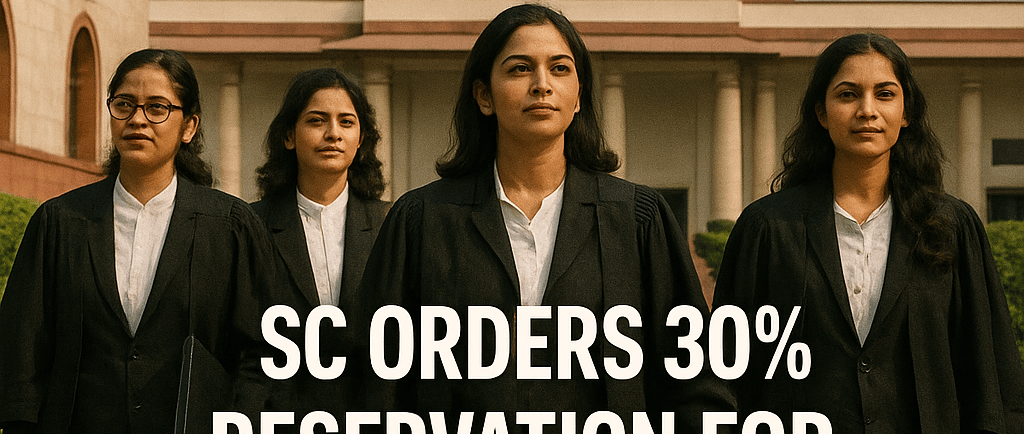SC Directs 30% Reservation for Women in Bar Associations: A Bold Step for Gender Parity in Legal Leadership


SC Directs 30% Reservation for Women in Bar Associations: A Bold Step for Gender Parity in Legal Leadership
On May 10, 2025, the Supreme Court of India made a landmark decision, directing that at least 30% of seats in Bar Associations and the position of Treasurer in Gujarat High Court and District Bar Associations must be reserved for women. This directive builds on similar orders passed in the past, including those for the Delhi High Court and the National Green Tribunal (NGT) Bar Associations, reflecting the court's continuous push for gender parity in the legal profession.
This move by the Supreme Court is a significant step in the long battle for gender equality within the legal sector, which has historically been male-dominated. The decision aims to enhance women's representation in positions of power and influence, ensuring that female lawyers have greater access to leadership roles within legal bodies. As per the order, the Gujarat High Court and District Bar Associations must implement the 30% reservation for the upcoming elections, providing a platform for women to take up essential leadership positions.
The Underlying Issues and the Court’s Rationale
Historically, women have been underrepresented in the Indian legal system, particularly in leadership positions. While women make up a significant proportion of law school graduates and entry-level positions in law firms, their numbers decrease drastically when it comes to senior roles such as judgeships and leadership within Bar Associations. This inequality has been a subject of concern for many years, prompting calls for affirmative action.
The Supreme Court’s decision is seen as a response to the ongoing gender disparity in the legal profession. By introducing reservations in Bar Associations, the Court is not only encouraging more women to participate in the leadership of the legal community but also reinforcing the goals of equality enshrined in Articles 14 and 15 of the Indian Constitution, which guarantee the right to equality and prohibit discrimination on the grounds of sex.
This step aligns with global efforts to empower women in male-dominated sectors, particularly in professions such as law, where representation of women in leadership roles is significantly low. The decision sends a strong message that gender parity in professional spheres is not just a matter of fairness, but also of effective governance and the strength of the legal system.
Previous Efforts and Expansion of the Directive
This new ruling follows the pattern of earlier steps taken by the Supreme Court to ensure greater participation of women in legal leadership. For example, a similar directive was issued in 2023 for the Delhi High Court Bar Association, mandating a 30% reservation for women. Furthermore, the National Green Tribunal Bar also saw similar measures, signaling a broader judicial intent to bridge gender gaps in legal institutions.
The Gujarat High Court’s implementation of this decision will undoubtedly serve as a model for other state and district bar associations across the country. With the reservation for leadership positions, women will have more opportunities to influence the policy and functioning of these important legal bodies, contributing to a more inclusive and diverse legal landscape.
Challenges and Moving Forward
While the reservation policy is a step forward, its implementation will require careful monitoring to ensure that it does not lead to tokenism but instead results in meaningful participation of women in legal leadership. Ensuring that the women elected or appointed to these positions are qualified and effective in their roles will be crucial to the success of the initiative.
Moreover, the success of the policy will depend on the continued support from the legal community, including male lawyers, who must work collaboratively to create an environment that fosters equality. A cultural shift within Bar Associations, where women are actively encouraged to participate in decision-making and leadership roles, will be essential for the long-term impact of this reform.
The Supreme Court’s decision to reserve 30% of seats for women in Bar Associations represents an important milestone in the ongoing fight for gender equality in India’s legal system. It not only empowers women lawyers but also ensures that their perspectives are included in shaping the future of the legal profession. By strengthening women’s representation in legal leadership, the Supreme Court has set a powerful precedent for other institutions to follow.
